Best Public-Private Partnerships (PPP) Lawyers in Tehran
Share your needs with us, get contacted by law firms.
Free. Takes 2 min.
List of the best lawyers in Tehran, Iran
About Public-Private Partnerships (PPP) Law in Tehran, Iran
Public-Private Partnerships (PPP) are cooperative agreements between government entities and private sector companies to finance, construct, and operate projects such as infrastructure, utilities, and public services. In Tehran, PPPs are increasingly used to deliver complex projects, manage rising urban demands, and stimulate economic growth. The legal landscape surrounding PPPs in Iran is evolving, with specific frameworks and regulation aimed at making these partnerships transparent, efficient, and beneficial for both parties. Understanding the PPP framework in Tehran involves recognizing the roles of government agencies, compliance requirements, investment protections, and contractual obligations that govern these projects.
Why You May Need a Lawyer
Engaging in a Public-Private Partnership involves intricate legal, financial, and operational considerations. Legal counsel can bring clarity and structure to these complex agreements. You may need a lawyer in these situations:
- Drafting, reviewing, or negotiating PPP contracts with government agencies
- Navigating local legal requirements and regulatory approvals
- Managing cross-border or foreign investment concerns in Tehran
- Addressing disputes, delays, or breaches in PPP agreements
- Handling project financing, investment guarantees, or risk-sharing structures
- Protecting intellectual property or confidential business information
- Ensuring compliance with anti-corruption, transparency, and procurement laws
Local Laws Overview
In Tehran, PPPs are mainly governed by national Iranian laws, ministerial regulations, and municipal policies that address foreign investment, procurement, and infrastructure development. Key aspects to consider include:
- The Law on Partnership of the Private Sector in the Execution of Public Projects: This legislative framework sets out general standards for partnership mechanisms, project structuring, and dispute resolution.
- The Law on Tenders and Government Procurement: Regulations dictate procurement processes, ensuring fairness and transparency in awarding PPP projects.
- Foreign Investment Promotion and Protection Act (FIPPA): This law provides guarantees and facilities for foreign investors engaging in PPP projects.
- Environmental, labor, and municipal compliance: Projects must adhere to local regulations related to environmental impact, workforce management, and urban planning within Tehran.
- Risk allocation and financial structuring: PPP contracts typically outline risk-sharing models and the division of financial and operational responsibilities.
These legal frameworks are supported by implementing guidelines from Tehran’s municipal authorities and sector-specific ministries, such as the Ministry of Roads and Urban Development and the Tehran Municipality.
Frequently Asked Questions
What types of projects are commonly delivered through PPPs in Tehran?
Common PPP projects include transportation infrastructure (metro and highways), water and wastewater facilities, energy plants, healthcare, and public building construction.
Can foreign firms participate in PPPs in Tehran?
Yes, foreign companies can participate, subject to compliance with FIPPA and local requirements. Approval from relevant authorities is necessary for foreign investment in PPPs.
How are PPP contracts structured in Tehran?
PPPs in Tehran are generally structured as long-term agreements defining the responsibilities, risk-sharing, financing, and operational obligations between the public and private partners.
What legal protections exist for private partners in PPPs?
Private partners are protected by contract law, investment guarantees under FIPPA, and dispute resolution clauses. The contract often includes mechanisms for compensation, step-in rights, and protection against unilateral government changes.
How are disputes in PPPs resolved?
Disputes are typically resolved through negotiation, mediation, or arbitration. Court litigation is also possible, though arbitration is often preferred for its speed and confidentiality.
What are the key risks in PPP agreements?
Key risks include regulatory changes, currency fluctuation, construction or operational delays, and termination risk. Contracts should allocate these risks between parties.
Is government financial support available for PPP projects?
Yes, government support may be available through guarantees, subsidies, or co-financing, especially for projects critical to public interest.
How is transparency ensured in the PPP procurement process?
The Law on Tenders and Government Procurement mandates competitive bidding, disclosure of evaluation criteria, and regular reporting to promote transparency and prevent corruption.
What compliance requirements must PPP projects meet?
PPP projects must meet standards relating to environmental protection, health and safety, local content, and labor rights, in addition to sectoral regulations.
How can a lawyer help with a PPP project in Tehran?
A lawyer can assist with contract drafting, risk analysis, regulatory compliance, negotiation, due diligence, and dispute resolution to ensure your rights and interests are fully protected.
Additional Resources
If you seek more information or support regarding PPPs in Tehran, consider the following resources:
- Tehran Municipality - Urban Development Department: Responsible for city-level PPP initiatives and providing relevant guidelines.
- Ministry of Economic Affairs and Finance: Issues foreign investment licenses and guidance under FIPPA.
- Ministry of Roads and Urban Development: Oversees large-scale infrastructure PPP projects in transportation and housing.
- Iran Chamber of Commerce, Industries, Mines and Agriculture (ICCIMA): Offers insights and directories for private sector practitioners in PPPs.
- Legal advisory firms specializing in public-private law and infrastructure in Tehran.
Next Steps
If you are considering entering a PPP, or need advice regarding an existing partnership in Tehran, here’s how you can proceed:
- Gather all relevant documents, including proposals, contracts, licenses, and government correspondence.
- Identify the specific legal issue or information you need clarified, such as contract terms, investment protection, or regulatory compliance.
- Consult with a lawyer experienced in PPP law within Tehran - preferably one with knowledge of both local and international legal frameworks.
- Schedule a consultation to discuss your needs and receive tailored advice based on your objectives and circumstances.
- Maintain ongoing communication with all partners and regulatory authorities to ensure continued compliance and mitigate dispute risks.
- Consider joining professional or industry associations for updates, best practices, and networking opportunities in the PPP field.
A skilled legal advisor will help clarify your rights and responsibilities, provide strategic guidance on negotiations, and protect your investments throughout the PPP lifecycle.
Lawzana helps you find the best lawyers and law firms in Tehran through a curated and pre-screened list of qualified legal professionals. Our platform offers rankings and detailed profiles of attorneys and law firms, allowing you to compare based on practice areas, including Public-Private Partnerships (PPP), experience, and client feedback.
Each profile includes a description of the firm's areas of practice, client reviews, team members and partners, year of establishment, spoken languages, office locations, contact information, social media presence, and any published articles or resources. Most firms on our platform speak English and are experienced in both local and international legal matters.
Get a quote from top-rated law firms in Tehran, Iran — quickly, securely, and without unnecessary hassle.
Disclaimer:
The information provided on this page is for general informational purposes only and does not constitute legal advice. While we strive to ensure the accuracy and relevance of the content, legal information may change over time, and interpretations of the law can vary. You should always consult with a qualified legal professional for advice specific to your situation.
We disclaim all liability for actions taken or not taken based on the content of this page. If you believe any information is incorrect or outdated, please contact us, and we will review and update it where appropriate.
















